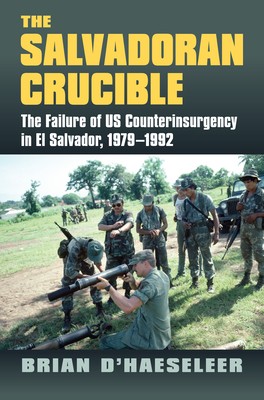
- We will send in 10–14 business days.
- Author: Brian D'Haeseleer
- Publisher: University Press Of Kansas
- Year: 2017
- Pages: 272
- ISBN-10: 0700625127
- ISBN-13: 9780700625123
- Format: 16 x 23.6 x 2.5 cm, hardcover
- Language: English
- SAVE -10% with code: EXTRA
Reviews
Description
In 1979, with El Salvador growing ever more unstable and ripe for revolution, the United States undertook a counterinsurgency intervention that over the following decade would become Washington's largest nation-building effort since Vietnam. In 2003, policymakers looked to this "successful" undertaking as a model for US intervention in Iraq. In fact, Brian D'Haeseleer argues in The Salvadoran Crucible, the US counterinsurgency in El Salvador produced no more than a stalemate, and in the process inflicted tremendous suffering on Salvadorans for a limited amount of foreign policy gains. D'Haeseleer's book is a deeply informed, dispassionate account of how the Salvadoran venture took shape, what it actually accomplished, and what lessons it holds.
A historical analysis of the origins of US counterinsurgency policy provides context for understanding how precedents informed US intervention in El Salvador. What follows is a detailed, in-depth view of how the counterinsurgency unfolded--the nature, logic, and effectiveness of the policies, initiatives, and operations promoted by American strategists. D'Haeseleer's account disputes the "success" narrative by showing that El Salvador's achievements, mainly the spread of democracy, occurred as a result not of the American intervention but of the insurgents' war against the state. Most significantly, The Salvadoran Crucible contends that the reforms enacted during the war failed to address the underlying causes of the conflict, which today continue to reverberate in El Salvador. The book thus suggests a reassessment of the history of American counterinsurgency, and a course-correction for the future.EXTRA 10 % discount with code: EXTRA
The promotion ends in 10d.02:20:12
The discount code is valid when purchasing from 10 €. Discounts do not stack.
- Author: Brian D'Haeseleer
- Publisher: University Press Of Kansas
- Year: 2017
- Pages: 272
- ISBN-10: 0700625127
- ISBN-13: 9780700625123
- Format: 16 x 23.6 x 2.5 cm, hardcover
- Language: English English
In 1979, with El Salvador growing ever more unstable and ripe for revolution, the United States undertook a counterinsurgency intervention that over the following decade would become Washington's largest nation-building effort since Vietnam. In 2003, policymakers looked to this "successful" undertaking as a model for US intervention in Iraq. In fact, Brian D'Haeseleer argues in The Salvadoran Crucible, the US counterinsurgency in El Salvador produced no more than a stalemate, and in the process inflicted tremendous suffering on Salvadorans for a limited amount of foreign policy gains. D'Haeseleer's book is a deeply informed, dispassionate account of how the Salvadoran venture took shape, what it actually accomplished, and what lessons it holds.
A historical analysis of the origins of US counterinsurgency policy provides context for understanding how precedents informed US intervention in El Salvador. What follows is a detailed, in-depth view of how the counterinsurgency unfolded--the nature, logic, and effectiveness of the policies, initiatives, and operations promoted by American strategists. D'Haeseleer's account disputes the "success" narrative by showing that El Salvador's achievements, mainly the spread of democracy, occurred as a result not of the American intervention but of the insurgents' war against the state. Most significantly, The Salvadoran Crucible contends that the reforms enacted during the war failed to address the underlying causes of the conflict, which today continue to reverberate in El Salvador. The book thus suggests a reassessment of the history of American counterinsurgency, and a course-correction for the future.

Reviews